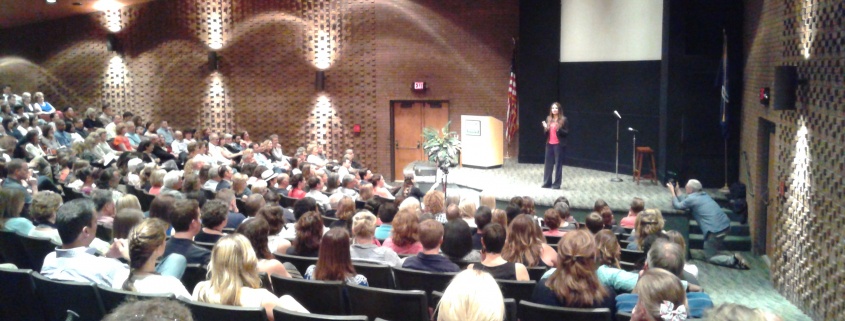Shefali Tsabary engages with hundreds of parents in Troy
By Adil James,
TMO contributing reporter
Dr. Shefali Tsabary may be the hottest current phenomenon in child psychology. She has been celebrated by Oprah Winfrey who said of her: “What I believe every parent wants is a deeper connection with their children. Now meet the woman that can help you get it and keep it.” She gave a TED speech entitled “Conscious Parenting,” and is an award winning author of several books. She is a sponsored speaker at the Dalai Lama Center for Peace Studies’ “Heart-Mind Speaker Series.”
Tsabary spoke in Troy on Friday May 8th, teaching a group of approximately 500 parents in a Michigan State University auditorium. She taught her philosophy of parenting through a process of self-improvement.
Her work is significant because she teaches a paradigm shifting view of parenting, a theme which could be stated as follows: that the focus of parenting should be and must be an inner journey toward improvement, rather than the production of a child “product.” While it may be impossible to raise children completely devoid of the hangups that haunted their parents and grandparents, parents can however raise children who have a sense of well-being and who are true to themselves through a process of parents using their children as mirrors to see their own personal flaws and improve on them.
The importance of raising children without hangups is a vital issue to Tsabary, who emphasizes that outwardly successful adults regularly come to her psychology practice to heal gaping emotional wounds from their childhood—wounds that could only truly have been healed by their own parents. Therefore perhaps to minimize injury to tomorrow’s adults Tsabary focuses on teaching parents to be conscious of their own flaws, hangups, and emotional baggage before reflexively passing those along to their helpless children.
Being a parent, Tsabary said Friday, is taking the opportunity of having children to pay attention to the kids, and go through an evolution via the children. She said that no person is really ready to change based on the advice of another person—the only force powerful enough to induce a person to change is the desire to accommodate his own children.
“Children are the mirror. You can see how you need to grow. Your pain is his pain, your rigidity is his rebellion.” In the disconnect between parent and child, she said, love is not enough to bridge the gap—what is missing is “parental consciousness.” Children try desperately to fill the void between their parent’s expectations and who they are, and thus give in to tragedy, and “throw away their authentic selves.”
Tsabary made use of a beautiful metaphor, that of Plato’s parable in which people live in a cave and, unable because of their fear to venture out into the broader world, cease even to believe that an outside world exists. Tsabary repeatedly advised her listeners to courageously move toward change in order to escape the confines in which they live. “The koolaid we drink is fear,” she said.
Another important point that Tsabary emphasized is that children are, as she said, “psychic sponges” who take in the irrational fears of their parents. They perceive with clarity the hypocrisy of their parents; she described hearing repeatedly from children she counsels their disgust at their parents’ hypocrisy.
“They hate our incongruences,” she said.
“Cultural myths hold us in Plato’s cave,” she said, before doing a verbal experiment with her audience to accentuate their adherence to what she called myths. Through the brief test session she showed the audience’s basic paradigm, that the goal of a parent is to guide, teach, mold each child.
Tsabary’s argument, however, is that “the myth is that parenting is about the child.” To accomplish the kind of parenting logically required by this paradigm, in which the parent must produce a happy, successful, educated, uber child—this paradigm requires an uber-parent, and also reduces the child to a product. All of the perfected attributes demanded of the child, according to her view, are actually reflections of our own insecurities as adults.
“The more void we feel within as parents, the more perfect we want the kid to be.” This kind of parenting is, she said, “a race to nowhere” which promotes a hyper-organized and regimented childhood which is not conducive to the child’s well-being.
“Life at its core,” she argued, “is pain, and the deep acceptance of pain, which leads to joy.” This fact requires self-awareness in the child and the adult.
Being more authentic is more important than showing love, she said.
Dr. Tsabary’s speech was advertised in local mosque e-newsletters, pointing to the increasing focus on child-rearing and family well-being in the Muslim community. This focus has also been highlighted by recent ISPU studies on divorce and child-rearing.
17-20
















2015
1,529 views
views
0
comments